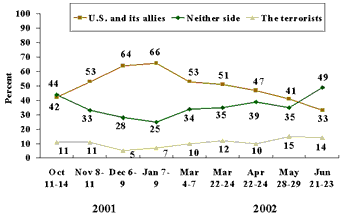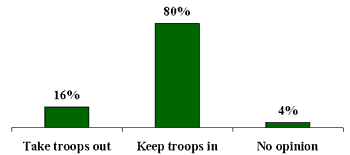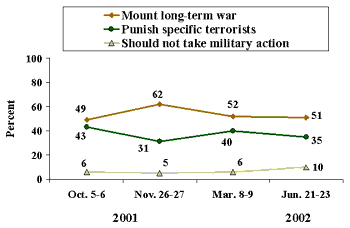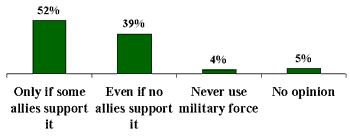GALLUP NEWS SERVICE
PRINCETON, NJ -- As recent news stories have focused on a possible resurgence of the al Qaeda terrorist organization, Americans have become less confident that the United States and its allies are winning the war against terrorism, according to a new CNN/USA Today/Gallup poll. Although Americans express widespread support for leaving U.S. troops in Afghanistan, they remain somewhat divided both on how extensive the war on terrorism should be, and whether the United States should use military force against another country if it receives no support from its Western allies.
The poll, conducted June 21-23, shows that 33% of Americans say the United States and its allies are currently winning the war against terrorism, down from 41% who expressed that view at the end of May, and down from 66% who felt that way in January. Almost half of the public, 49%, believes that neither side is winning, up from 35% last month. In addition, 14% of Americans say the terrorists are winning, a finding essentially unchanged from last month.
| Who Is Winning the War on Terrorism? |
 |
The decline in perceptions about who is winning the war apparently has little impact on what Americans think the United States should do in Afghanistan. Eighty percent say the United States should keep its troops in that country, while just 16% say the troops should be removed.
| Should the United States Take Troops out of Afghanistan, or Keep Troops In? |
 |
| Jun. 21-23, 2002 |
Americans divided on best strategy
The poll also shows that just over half, 51%, of all Americans believe the United States should mount a long-term war to defeat global terrorist networks, while 35% opt for the more limited goal of punishing specific terrorist groups responsible for the attacks on the World Trade Center. These views are similar to those expressed last March, although the percentages are significantly different from those measured in November of last year. At that time, in the wake of a successful military operation in Afghanistan, Americans supported the long-term war over the limited objective by a two-to-one margin, 62% to 31%.
| What Actions Should the United States Take To Deal With Terrorism? |
 |
Americans are also divided on whether the United States should act alone in its fight on terrorism, if its allies refuse to help. A bare majority, 52%, say this country should use military force only if some of its Western allies support that action, while 39% say the United States should military force even if it receives no allied support. Another 4% say the United States should never use force.
| When Should the United States Take Military Action Against Another Country? |
 |
| Jun. 21-23, 2002 |
Major partisan and gender differences
The poll shows major differences in views among men and women, and among the three partisan groups of Democrats, independents and Republicans.
Men are more likely than women to say the United States and its allies are winning the war (40% to 28%, respectively), that the United States should mount a long-term war on terrorism (61% versus 41%), and that the United States should use military force even if it receives no support from its allies (51% versus 28%).
Partisan differences on these questions are also substantial. Republicans are much more likely than either independents or Democrats to say that the United States and its allies are winning the war (45% of Republicans take this view, compared with 27% of independents and 28% of Democrats), that the United States should mount a long-term war on terrorism (62% for Republicans versus 48% for independents and 42% for Democrats), and that the United States should use military force even without allied support (46% among Republicans, 39% among independents and 32% among Democrats).
Survey Methods
The latest results are based on telephone interviews with 1,020 national adults, aged 18 and older, conducted June 21-23, 2002. For results based on the total sample of national adults, one can say with 95% confidence that the margin of sampling error is ±3%. In addition to sampling error, question wording and practical difficulties in conducting surveys can introduce error or bias into the findings of public opinion polls.
Turning to the war against terrorism,
Who do you think is currently winning the war against terrorism -- [ROTATED: the U.S. and its allies, neither side, or the terrorists]?
|
U.S. and |
Neither |
The |
No |
|
|
% |
% |
% |
% |
|
|
2002 Jun 21-23 |
33 |
49 |
14 |
4 |
|
2002 May 28-29 |
41 |
35 |
15 |
9 |
|
2002 Apr 22-24 |
47 |
39 |
10 |
4 |
|
2002 Mar 22-24 |
51 |
35 |
12 |
2 |
|
2002 Mar 4-7 |
53 |
34 |
10 |
3 |
|
2002 Jan 7-9 |
66 |
25 |
7 |
2 |
|
2001 Dec 6-9 |
64 |
28 |
5 |
3 |
|
2001 Nov 8-11 |
53 |
33 |
11 |
3 |
|
2001 Oct 11-14 |
42 |
44 |
11 |
3 |
Which of the following comes closest to your view about the actions the United States should take to deal with terrorism -- [ROTATED: the U.S. should mount a long-term war to defeat global terrorist networks, the U.S. should take military action ONLY to punish specific terrorist groups responsible for the attacks on the World Trade Center, or the U.S. should not take military action but should rely only on economic and diplomatic efforts to deal with terrorism]?
|
Mount long- |
Punish specific terrorists involved |
Should not take military action |
No |
|
|
% |
% |
% |
% |
|
|
2002 Jun 21-23 |
51 |
35 |
10 |
4 |
|
2002 Mar 8-9 |
52 |
40 |
6 |
2 |
|
2001 Nov 26-27 |
62 |
31 |
5 |
2 |
|
2001 Oct 5-6 |
49 |
43 |
6 |
2 |
Which comes closer to your view -- [ROTATED: the U.S. should take all its troops out of Afghanistan, (or) the U.S. should keep troops in Afghanistan]?
|
|
Take its troops out |
Keep troops in |
No opinion |
|
2002 Jun 21-23 |
16% |
80% |
4% |
Which comes closer to your view about the circumstances under which the U.S. should use military force against another country -- [ROTATED: the U.S. should only use military force if at least some of our Western allies support that action, the U.S. should use military force even if none of our Western allies support that action], or the U.S. should never use military force?
|
|
Only if some support |
Even if none support |
Never use |
No |
|
2002 Jun 21-23 |
52% |
39% |
4% |
5% |
